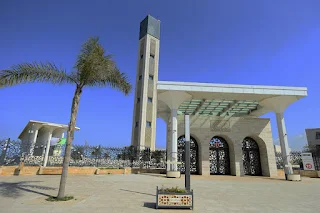Algeria inaugurated a gigantic mosque on its Mediterranean coastline Sunday after years of political upheaval transformed the project from a symbol of state-sponsored strength and religiosity to one of delays and cost overruns.
Built by a Chinese construction firm throughout the 2010s, the Great Mosque of Algiers features the world's tallest minaret, measuring at 869 feet (265 meters). The third largest mosque in the world and the largest outside Islam's holiest cities, its prayer room accommodates 120,000 people.
Its modernist design contains Arab and North African flourishes to honour Algerian tradition and culture as well as a helicopter landing pad and a library that can house up to 1 million books.
The inauguration would guide Muslims "toward goodness and moderation," said Ali Mohamed Salabi, the General Secretary of World Union of Muslim Ulemas.
Propagating a moderate brand of Islam has been a key priority in Algeria since government forces subdued an Islamist-led rebellion throughout the 1990s when a bloody civil war swept the country.
Algerian President Abdelmajid Tebboune inaugurated the mosque, fulfilling his promise to open it with great pomp and circumstance. The event, however, was mainly ceremonial. The mosque has been open to international tourists and state visitors to Algeria for roughly five years. An earlier ceremony was delayed.
The timing allows the mosque to officially open to the public in time to host nightly prayers during the Muslim holy month of Ramadan, which begins next month.
Beyond its gigantic dimensions, the mosque is also known for the delays and controversy that characterized the seven years it was under construction, including the choice of site, which experts warned was seismically risky.
The state denied that in a news release, Sunday posted on APS, the state news agency website. Throughout the delays and cost overruns, the project never stopped feeding Algerians' anger, with many saying they'd rather have four hospitals built throughout the country.
The project's official cost was $898 million.
The mosque was originally a project of former President Abdelaziz Bouteflika, who designed it to be the largest in Africa. He wanted it to be his legacy and called "Abdelaziz Bouteflika Mosque" much like Mosque Hassan II in Casablanca, Morocco.
That mosque, named after the former King of Morocco — Algeria's neighbour and regional rival — was once marketed as Africa's largest.
However, the protests that swept Algeria in 2019 and led him to resign after 20 years in power prohibited Bouteflika's from realizing his plans, naming the mosque after himself or inaugurating it in February 2019 as scheduled.
The mosque — along with a major national highway and a million new housing units — each was marred by suspicions of corruption during the Bouteflika era, with suspected kickbacks to contractors then paid to state officials.
Nigerian army denies report of coup plot
The Nigerian army has strongly denied claims of a coup plot. The Defence Headquarters labelled the reports false and urged the public to disregard them.
This comes after Sahara Reporters suggested that the Presidential Guard, tasked with the president's protection, was on alert due to coup suspicions.
The report alleged that emergency meetings had been held with the Nigerian president.
In response to the article, DHQ said its full commitment was to protecting and sustaining democracy in Nigeria.
The West African country is currently suffering a punishing economic crisis, with some warning the country is at a tipping point.


Good
ReplyDelete